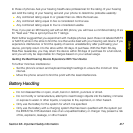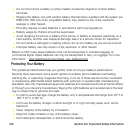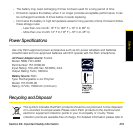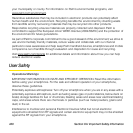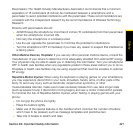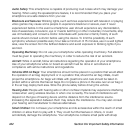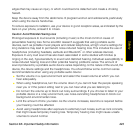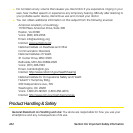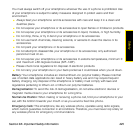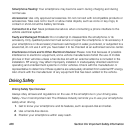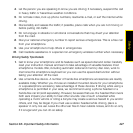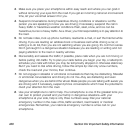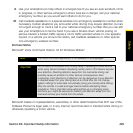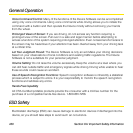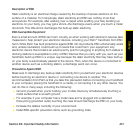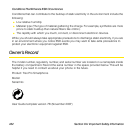
Section 8A: Important Safety Information 425
Safety
You must always switch off your smartphone wherever the use of a phone is prohibited. Use
of your smartphone is subject to safety measures designed to protect users and their
environment.
ⅷ Always treat your smartphone and its accessories with care and keep it in a clean and
dust-free place.
ⅷ Do not expose your smartphone or its accessories to open flames or lit tobacco products.
ⅷ Do not expose your smartphone or its accessories to liquid, moisture, or high humidity.
ⅷ Do not drop, throw, or try to bend your smartphone or its accessories.
ⅷ Do not use harsh chemicals, cleaning solvents, or aerosols to clean the device or its
accessories.
ⅷ Do not paint your smartphone or its accessories.
ⅷ Do not attempt to disassemble your smartphone or its accessories; only authorised
personnel must do so.
ⅷ Do not expose your smartphone or its accessories to extreme temperatures, minimum 0
and maximum +60 degrees Celsius (32F–140F).
ⅷ Please check local regulations for disposal of electronic products.
ⅷ Do not carry your smartphone in your back pocket as it could break when you sit down.
Battery: Your smartphone includes an internal lithium-ion polymer battery. Please note that
use of certain data applications can result in heavy battery use and may require frequent
battery charging. Any disposal of the smartphone or battery must comply with laws and
regulations pertaining to lithium-ion or lithium-ion polymer batteries.
Demagnetisation: To avoid the risk of demagnetisation, do not allow electronic devices or
magnetic media close to your smartphone for a long time.
Normal Use Position: When making or receiving a phone call, hold your smartphone to your
ear, with the bottom towards your mouth or as you would a fixed line phone.
Emergency Calls: This smartphone, like any wireless phone, operates using radio signals,
which cannot guarantee connection in all conditions. Therefore, you must never rely solely on
any wireless phone for emergency communications.



